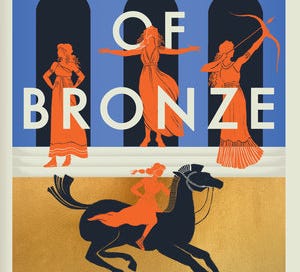Book Review: Daughters of Bronze by A.D. Rhine
A review of a tale of life inside Troy during the Trojan war, and the lengths women would go to in order to fight for their homeland
It’s been a while since we’ve taken on a retelling of the Trojan War in the review section of this blog, and for good reason: a handful of entries in that subgenre do little to transformatively retell Homer’s famous tale. Put simply, I’ve been disappointed. When Daughters of Bronze rolled into my purview, my expectations had been sufficiently suppressed to allow a good novel to surprise me.
The synopsis pitches the plot in a way that makes an effort to expand upon the set plot of the Iliad in a creative manner: the women of Troy seek to end the war through an intricate web of female informants working as healers and handmaidens throughout the Achaean camp. This is done outside the purview of the Trojan leadership, which often leads to tension and fear of being found out. Not only is the male-dominated society portrayed as stuck-in-their-ways about the “rules” of combat, but each individual leader thirsts for blood. The various proposed duels between the chosen champions of each side are presented as peaceable and diplomatic approaches in modern scholarship, but A. D. Rhine interprets them as spectacles. Though I don’t necessarily agree with the assessment, it’s certainly interesting to think about how leaders have portrayed war as a necessary evil but then would turn around and make it into a sporting event.
I don’t often look too deeply into the biographies of authors I cover on this website, but the two women using this pseudonym have tied their personal experiences into the plot in such a way that merits additional comment. Most of the writers who have tackled the mythological retelling have done so from the perspective of their appreciation of either history or mythology, but this pair draws on their shared upbringing in the world of military “brats,” as they put it. The parts of the novel that take place inside Troy focus on the lived experiences of those who have to watch their fathers, brothers, and husbands go out to fight without being able to have an impact on whether they will come home at night. What help they do provide must either be done in secret through the aforementioned web of espionage or through emotional support. It’s a perspective of war that has become more valuable to historians in recent years because of how few accounts have survived throughout the ages. Tracing particular female spies back to Greco-Roman times is difficult, but there are a handful of well-known cases from the American Civil War. It’s a lesser-discussed struggle that may be fabulized here but is real elsewhere.
In a way, this novel represents the familial, auxiliary life in a military community in an analogous way to what Daniel Mendelsohn’s perspective on paternal relations did for An Odyssey, but in a fictitious, parable-like format. The closest equivalent that comes to mind is Lisa Peterson’s “An Iliad” stage play, but even that was written in response to the Iraq War and not as a firsthand experience of the effects of combat on those in its periphery. Both authors utilize this shared experience, as well as their backgrounds in classical literature, to extract the most on an emotional level from this concept.
Because of the new system I have been using to source upcoming projects, I’ve found myself blindsided by a handful of novels that were secretly sequels, and I hadn’t done enough due diligence prior to receiving them to figure that out. Bad on me. To tell the truth, though, it hasn’t really backfired all that horribly except in this case. I was never truly lost while reading, but I struggled to understand the precise time book-wise this story took place in the Iliad in certain places. By the birth of Astyanax I felt I had a definitive anchor on the timeline. Still, I’d recommend reading the first book in the series, Horses of Fire, before continuing on to this sequel.
The one major complaint about this book I have is the constant switching back and forth between narrators. I’ve read books that change perspective before, but they all tend to have longer chapters and less than four narrators. Iain Pears’ An Instance of the Fingerpost, which I read last year and reviewed in my wrap-up, effectively wrote four novellas about the same set of circumstances but they were presented back-to-back rather than intertwined. Some of the chapters in Daughters of Bronze happen at the same time as others, while others happen consecutively, and I found myself flipping back to the chapter headings a handful of times to confirm that I was reading an account of the narrator I expected to. It was only a small nuisance, but enough to put a damper on the whole experience. All in all, this was a solid 1 star book, and I hope to see more from this author in the future.





